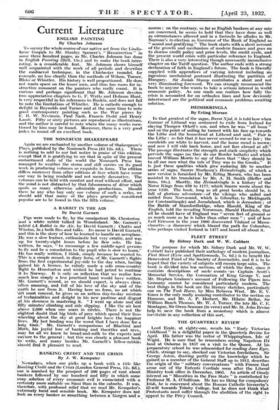Nowadays, when one picks up a book with a title
like Rdnking Credit and the Crisis (London General Press, 12s. 6d.). one is numbed by the prospect of 200 pages of rant about bankers followed by one hundred and fifty in which some snap solution of every economic evil is enunciated with- a certainty more suitable on Sinai than in the suburbs. It was, therefore, with profound relief that we read Mr. Kempster's extremely lucid and sensible book. Mr. Kempster does not !look on every banker as something between a Gorgon and a moron ; on the contrary, so far as English bankers at any rate are concerned, he seems to hold that they have done as well as circumstances allowed and in a footnote he alludes to Mr. Norman's re-election as Governor of the Bank Of England as " sound and gratifying." The book starts with a short account of the growth and mechanism of modern finance and goes on to discuss credit policy and price levels, the credit cycle, and the present world crisis with particular reference to England. There is also a very interesting though necessarily inconclusive chapter on the Tariff question. The author ends with a strong declaration of faith in England's future. The book is liberally supplied with appendices of varying interest including an ingenious mechanical postcard illustrating the partition of Hungary. Sir Josiah Stamp contributes a short and not very illuminating foreword. We can strongly reconunend the book to anyone who wants to take a serious interest in world economic policy. As one reads one realizes how fully the crisis is accounted for on orthodox lines and how deviously intertwined are the political and economic problems awaiting solution.






































 Previous page
Previous page